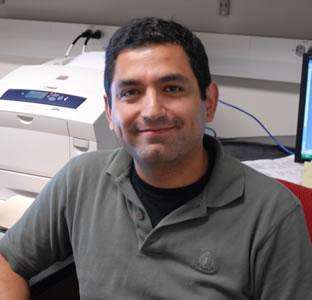UTSA biology professor awarded $300,000 NSF grant for brain research

Fidel Santamaria, associate professor of biology in the UTSA College of Sciences, is one of 36 researchers in the nation selected to receive a two-year $300,00 National Science Foundation (NSF) Early Concept Grant for Exploratory Research (EAGER). The funding supports President Obama's BRAIN Initiative, a federal effort to support researchers to create new technology that will demystify complex brain processes.
According to Santamaria, complex behaviors in neuroscience are broken into the interactions of multiple components, each working in its own characteristic temporal framework. However, in many cases an in-depth look at the data reveals that mechanisms at one scale are strongly influenced by the activity of the system at all scales of analysis. As a result, the system cannot be separated into independent components and traditional analysis techniques cannot provide an appropriate description of how the system works. In such cases, the activity of a system follows a mathematical formula known as a power-law.
The team lead by Santamaria is hypothesizing that the same power-law framework that he has used to study biophysical processes at the cellular and sub-cellular level in neurons can be applied to study complex animal and human activity. This framework has the potential to transform traditional approaches to understanding brain networks, and to impact experimental design, data analysis, and the mechanistic interpretation of experimental results.
Santamaria and his colleagues will use the grant to build computational tools to analyze and model power-law dynamics at multiple scales of interest in neuroscience, from molecules to behavior. The team will build a computational toolbox using state-of-the-art algorithms and computational resources at UTSA and at the Texas Advanced Computer Center in Austin.
The toolbox will be able to process Big Data streams generated by different types of neuroscience experiments, from those that record the electrical activity of single neurons, to the production of complex motor activity in animals. Santamaria will also use a little used branch of mathematics known as fractional differential equations. Together, the computational and theoretical infrastructure will be made available to all neuroscientists to analyze and model their results.
To conduct the research, Santamaria will collaborate with Todd Troyer and Nicole Wicha, both associate professors in the UTSA Department of Biology.
Troyer, an expert in songbird research, will monitor songbirds from birth to maturity to discover how the birds learn to construct their songs from scales ranging from individual sounds to long sequences of songbird 'syllables'."
"Birds learn their song by imitating adults, similar to how humans learn to speak," said Troyer.
Wicha's expertise is in the brain basis of language comprehension. She will record electroencephalograms (EEGs), which measure changes in brain activity on the order of milliseconds, while volunteers perform a language comprehension task. She will then repeat the test multiple times over a one-month period, allowing the team to study changes in brain activity at multiple time scales.
The two laboratories will generate Big Data streams in which temporal correlations can be measured on a wide range of timescales. Data from these labs will serve as test beds and incubators for applying power-law dynamic analysis and modeling concepts at multiple levels of biological organization in the brain.
"This research is a combination of theoretical and experimental work," said Santamaria. "We will watch a bird sing, analyze the data and put it into a theoretical context. We will look at how humans process language. We have tools that work from the statistical point of view all the way to the theoretical differential equations. This research is an example of how biology is changing into a field in which theory and experiments can be done in the same place."
Provided by University of Texas at San Antonio